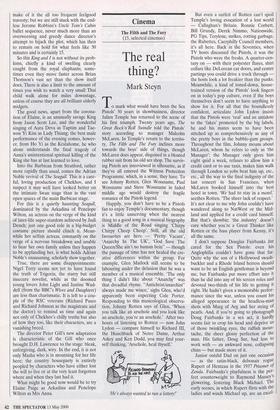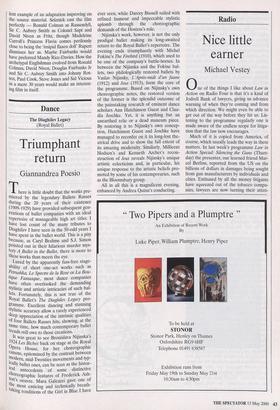Cinema
The real thing?
Mark Steyn
To mark what would have been the Sex Pistols' 50 years in showbusiness, director Julien Temple has returned to the scene of his first triumph. Twenty years ago, The Great Rock'n'Roll Swindle told the Pistols' story according to manager Malcolm McLaren. In Temple's return to the territo- ry, The Filth and The Fury inclines more towards the boys' side of things, though McLaren does appear, disguised in a bloated rubber suit from his old sex shop. The surviv- ing Pistols are interviewed in silhouette, as if they've all entered the Witness Protection Programme, which, in a sense, they have. To see Johnny Rotten, Glen Wossname, Paul Wossname and Steve Wossname in faded middle age would destroy the fragile romance of the Pistols legend.
Happily, you don't have to be a Pistols fan to enjoy Temple's documentary, though it's a little unnerving when the nearest thing to a good song in a musical biography is Middle of the Road singing 'Chirpy Chirpy Cheep Cheep'. Still, all the old favourites are here — 'Pretty Vacant', `Anarchy In The UK', 'God Save The Queen/She ain't no human bein" — though the passage of time has not healed the cre- ative differences within the group. For example, Glen Matlock still seems to be labouring under the delusion that he was a member of a musical ensemble. 'The only thing I didn't like about "Anarchy" was that dreadful rhyme. "Antichrist/anarchist" always made me wince,' sighs Glen, who'd apparently been expecting Cole Porter. Responding to this musicological observa- tion, Johnny Rotten says of Glen, 'When you talk like an arsehole and you look like an arsehole, you're an arsehole.' After two hours of listening to Rotten — now John Lydon — compare himself to Richard III, the Hunchback of Notre Dame, Arthur Askey and Ken Dodd, you may find your- self thinking, `Arsehole, heal thyself.'
He's always wanted to run a lottery!' But even a surfeit of Rotten can't spoil Temple's loving evocation of a lost world — Callaghan's Britain. Ronnie Corbett, Bill Grundy, Derek Nimmo, Nationwide, PG Tips, Terylene, strikes, rotting garbage, the Rubettes, Caerphilly Council members, it's all here. Back in the Seventies, when TV hosts discussed the Pistols, it was the Pistols who were the freaks. A quarter-cen- tury on — with their polyester flares, shirt collars like DeLorean car doors, and centre partings you could drive a truck through — the hosts look a lot freakier than the punks. Meanwhile, a kind of toned-down, house- trained version of the Pistols' look lingers on in today's pop culture, even if the boys themselves don't seem to have anything to show for it. For all that the boundlessly confident, articulate John Lydon insists that the Pistols were 'real' and an antidote to the 'fakes' promoted by the big labels, he and his mates seem to have been stitched up as comprehensively as any of the pretty boys in the bubble-gum groups. Throughout the film, Johnny moans about McLaren, whom he refers to only as 'the Manager': the Manager only gives him eight quid a week, refuses to allow him a credit card or to use taxis, makes him walk through London so yobs beat him up, etc., etc., all the way to the final indignity of the last concert in San Francisco, when McLaren booked himself into the best hotel in town. 'We had to stay in a motel,' seethes Rotten. 'The sheer lack of respect.' It's not clear to me why John couldn't have wandered along to NatWest or the Mid- land and applied for a credit card himself. But that's showbiz: 'the industry' doesn't care whether you're a Great Thinker like Rotten or the bass player from Kenny, it's all the same.
I don't suppose Douglas Fairbanks kr cared for the Sex Pistols: even his Anglophilia couldn't have gone that far. Quite why the son of a Hollywood swash- buckler and a Rhode Island heiress should want to be an English gentleman is beyond me, but Fairbanks put more effort into it than he did into any of his screen roles and devoted two-thirds of his life to getting it right. He hadn't given a memorable perfor- mance since the war, unless you count his alleged appearance in the headless-man shots with Marg of Arg and her string of pearls. And, if you're going to photograph Doug Fairbanks in a sex act, it hardly seems fair to crop his head and deprive us of those twinkling eyes, the raffish mous- tache, the sheer glossy perfection of the man. His father, Doug Snr, had less to work with — an awkward nose, collapsing chins — but made more of it.
Junior outdid Dad on just one occasion — as the satin-black, debonair rogue Rupert of Hentzau in the 1937 Prisoner of Zenda. Fairbanks's playfulness is the per- fect counterweight to Raymond Massey 's glowering, festering Black Michael. The early scenes, in which Rupert flirts with the ladies and winds Michael up, are an excel- lent example of an adaptation improving on the source material. Selznick cast the film perfectly — Ronald Colman as Rassendyll, Sir C. Aubrey Smith as Colonel Sapt and David Niven as Fritz, though Madeleine Carroll's Princess Flavia comes perilously close to being the `insipid flaxen doll' Rupert dismisses her as. Maybe Fairbanks would have preferred Mandy Rice-Davies. How the archetypal Englishman evolved from Ronald Colman, David Niven, Douglas Fairbanks Jr and Sir C. Aubrey Smith into Johnny Rot- ten, Paul Cook, Steve Jones and Sid Vicious in a mere 30 years would make an interest- ing film in itself.



























































 Previous page
Previous page